中共中央关于党的百年奋斗重大成就和历史经验的决议(双语全文)
新华网 2021-11-18 09:20

(八)在社会建设上
8. Promoting social advancement
改革开放以后,我国人民生活显著改善,社会治理明显改进。同时,随着时代发展和社会进步,人民对美好生活的向往更加强烈,对民主、法治、公平、正义、安全、环境等方面的要求日益增长。党中央强调,人民对美好生活的向往就是我们的奋斗目标,增进民生福祉是我们坚持立党为公、执政为民的本质要求,让老百姓过上好日子是我们一切工作的出发点和落脚点,补齐民生保障短板、解决好人民群众急难愁盼问题是社会建设的紧迫任务。必须以保障和改善民生为重点加强社会建设,尽力而为、量力而行,一件事情接着一件事情办,一年接着一年干,在幼有所育、学有所教、劳有所得、病有所医、老有所养、住有所居、弱有所扶上持续用力,加强和创新社会治理,使人民获得感、幸福感、安全感更加充实、更有保障、更可持续。
Since the launch of reform and opening up, the Chinese people have witnessed notable improvements in their living standards and in social governance. Meanwhile, in pace with the changing times and social progress, they have developed an increasingly strong desire for a better life and growing demands for democracy, rule of law, fairness, justice, security, and a better environment.
The Central Committee has stressed that satisfying the people’s aspirations for a better life is the goal of all the Party’s work; that improving the people’s wellbeing is an essential requirement in the Party’s commitment to serving the public good and governing for the people; that ensuring a better life for the people is the immutable aim of all the Party’s endeavors; and that addressing inadequacies in support for people’s basic needs and solving the most pressing difficulties of great concern to the people are urgent tasks in advancing social development.
We must, therefore, strengthen social development by laying stress on ensuring and improving people’s wellbeing. We must do everything within our capacity and keep working year by year to tackle one issue after another. In particular, we need to make steady progress in ensuring people’s access to childcare, education, employment, medical services, elderly care, housing, and social assistance, and we need to strengthen social governance by developing new practices, so that the people will have a more robust, solid, and sustainable sense of fulfillment, happiness, and security.
党深刻认识到,小康不小康,关键看老乡;脱贫攻坚是全面建成小康社会的底线任务,只有打赢脱贫攻坚战,才能确保全面建成小康社会、实现第一个百年奋斗目标;必须以更大决心、更精准思路、更有力措施,采取超常举措,实施脱贫攻坚工程。党坚持精准扶贫,确立不愁吃、不愁穿和义务教育、基本医疗、住房安全有保障工作目标,实行“军令状”式责任制,动员全党全国全社会力量,上下同心、尽锐出战,攻克坚中之坚、解决难中之难,组织实施人类历史上规模最大、力度最强的脱贫攻坚战,形成伟大脱贫攻坚精神。党的十八大以来,全国八百三十二个贫困县全部摘帽,十二万八千个贫困村全部出列,近一亿农村贫困人口实现脱贫,提前十年实现联合国二〇三〇年可持续发展议程减贫目标,历史性地解决了绝对贫困问题,创造了人类减贫史上的奇迹。
In the push to moderate prosperity, the Party was deeply aware that raising the living standards of rural residents was critical. Only by securing a victory in the fight against poverty, which is a fundamental task in building a moderately prosperous society in all respects, could China fulfill its First Centenary Goal. Therefore, extraordinary moves were needed to advance the fight against poverty with greater resolve, more targeted approaches, and more powerful measures.
To this end, the Party introduced a strategy of targeted poverty alleviation and set the objectives of guaranteeing food and clothing needs and ensuring access to compulsory education, basic medical services, and safe housing for the impoverished rural population. It applied a responsibility system whereby heads of Party and government bodies pledged themselves to win the fight against poverty in their localities. The whole Party, the entire nation, and all sectors of society were mobilized in the most extensive and aggressive anti-poverty campaign in human history. As they tackled the most daunting challenges and surmounted the most difficult obstacles, the Chinese people forged a great spirit in the fight against poverty.
Since the 18th National Congress, 832 counties, 128,000 villages, and nearly 100 million rural residents that fell below the current poverty line have been lifted out of poverty. China has thus achieved the poverty reduction target laid out in the UN 2030 Agenda for Sustainable Development ten years ahead of schedule, brought about a historic resolution to the problem of absolute poverty in China, and created a miracle in the human history of poverty reduction.
二〇二〇年,面对突如其来的新冠肺炎疫情,党中央果断决策、沉着应对,坚持人民至上、生命至上,提出坚定信心、同舟共济、科学防治、精准施策的总要求,开展抗击疫情人民战争、总体战、阻击战,周密部署武汉保卫战、湖北保卫战,举全国之力实施规模空前的生命大救援,慎终如始抓好“外防输入、内防反弹”,坚持统筹疫情防控和经济社会发展,最大限度保护了人民生命安全和身体健康,在全球率先控制住疫情、率先复工复产、率先恢复经济社会发展,抗疫斗争取得重大战略成果,铸就了伟大抗疫精神。
In 2020, facing the sudden outbreak of the novel coronavirus epidemic, the Central Committee responded calmly and decisively, and set out the general requirements to stay confident, stand united, and adopt a science-based approach and targeted measures. With the commitment to putting the people and human life above all else, the Central Committee led the whole nation in an all-out people’s war to curb the spread of the virus. It made well-conceived plans for the battles to defend Hubei Province and its capital city Wuhan and pooled nationwide resources to save lives on an unprecedented scale. It worked to ensure constant vigilance against imported cases and domestic resurgences, coordinated the Covid-19 response with economic and social development, and thus protected the health and safety of the people to the greatest extent possible. These efforts enabled China to lead the world in getting the epidemic under control, restarting work and production, and resuming economic and social development. With this major strategic success through our response, we have forged a great spirit in the fight against Covid-19.
为了保障和改善民生,党按照坚守底线、突出重点、完善制度、引导预期的思路,在收入分配、就业、教育、社会保障、医疗卫生、住房保障等方面推出一系列重大举措,注重加强普惠性、基础性、兜底性民生建设,推进基本公共服务均等化。我们努力建设体现效率、促进公平的收入分配体系,调节过高收入,取缔非法收入,增加低收入者收入,稳步扩大中等收入群体,推动形成橄榄型分配格局,居民收入增长与经济增长基本同步,农村居民收入增速快于城镇居民。实施就业优先政策,推动实现更加充分、更高质量就业。全面贯彻党的教育方针,优先发展教育事业,明确教育的根本任务是立德树人,培养德智体美劳全面发展的社会主义建设者和接班人,深化教育教学改革创新,促进公平和提高质量,推进义务教育均衡发展和城乡一体化,全面推行国家通用语言文字教育教学,规范校外培训机构,积极发展职业教育,推动高等教育内涵式发展,推进教育强国建设,办好人民满意的教育。我国建成世界上规模最大的社会保障体系,十亿二千万人拥有基本养老保险,十三亿六千万人拥有基本医疗保险。全面推进健康中国建设,坚持预防为主的方针,深化医药卫生体制改革,引导医疗卫生工作重心下移、资源下沉,及时推动完善重大疫情防控体制机制、健全国家公共卫生应急管理体系,促进中医药传承创新发展,健全遍及城乡的公共卫生服务体系。加快体育强国建设,广泛开展全民健身活动,大力弘扬中华体育精神。加强人口发展战略研究,积极应对人口老龄化,加快建设养老服务体系,调整优化生育政策,促进人口长期均衡发展。注重家庭家教家风建设,保障妇女儿童权益。加快发展残疾人事业。坚持房子是用来住的、不是用来炒的定位,加快建立多主体供给、多渠道保障、租购并举的住房制度,加大保障房建设投入力度,城乡居民住房条件明显改善。
To ensure and improve people’s wellbeing, the Party has introduced a range of major measures concerning income distribution, employment, education, social security, healthcare, and housing support in accordance with the principles of meeting basic needs, prioritizing key areas, improving institutions, and guiding expectations. Efforts have been focused on providing inclusive public services, meeting essential needs, and ensuring basic living standards, with progress made in providing equal access to basic public services.
We have worked to develop an income distribution system that emphasizes efficiency while promoting fairness. By adjusting excessive income, prohibiting illicit income, increasing the income of low-income groups, and steadily expanding the size of the middle-income group, we have promoted the formation of an olive-shaped pattern of distribution and ensured that personal incomes generally grow in step with economic growth and that rural income grows faster than urban income. We have implemented an employment-first policy and worked to achieve fuller and higher-quality employment.
We have worked to implement the Party’s education policy in full and given priority to educational development. We have made it clear that the fundamental task of education is to foster virtue and nurture a new generation of capable young people with the moral grounding, intellectual ability, physical vigor, aesthetic sensibility, and work skills needed to join and carry on the socialist cause. We have bolstered reform and innovation in education and teaching in order to promote fair and higher-quality education. We have worked to promote balanced development and urban-rural integration in compulsory education, make education and instruction in the standard spoken and written Chinese language available across the country, and keep off-campus tutoring well-regulated. We have taken active steps to develop vocational education and worked to bring out the full potential of higher education. Through these efforts, we have strived to develop a strong education system that the people are satisfied with.
China has established the world’s largest social security system, with 1.02 billion people covered by basic old-age insurance and 1.36 billion people by basic medical insurance.
We have advanced the Healthy China Initiative across the board. Following the principle of putting prevention first, we have deepened reform of the medical and healthcare systems and shifted the focus of medical and health care down to the community level, channeling resources accordingly. We have taken prompt action to improve major epidemic prevention and control systems and mechanisms as well as the national public health emergency management system. We have worked to promote the preservation, innovation, and development of traditional Chinese medicine and strengthened the public health service system covering both urban and rural areas.
As we have stepped up our efforts to build China into a sporting nation, we have launched extensive public fitness activities and vigorously promoted China’s sporting spirit.
We have intensified research on our population development strategy. In response to population aging, we have accelerated the development of elderly care services, and we have adjusted and improved the family planning policy so as to promote balanced development of the population over the long term.
We have given greater weight to strengthening family ties, values, and traditions, and worked to better protect the rights and interests of women and children. We have acted more quickly to develop programs for people with disabilities.
Adhering to the principle that housing is for living in and not for speculation, we have moved faster to build a housing system with multiple types of suppliers and support channels that encourages both renting and buying, and increased investment in the construction of government-subsidized housing. All this has led to significant improvements in urban and rural housing conditions.
党着眼于国家长治久安、人民安居乐业,建设更高水平的平安中国,完善社会治理体系,健全党组织领导的自治、法治、德治相结合的城乡基层治理体系,推动社会治理重心向基层下移,建设共建共治共享的社会治理制度,建设人人有责、人人尽责、人人享有的社会治理共同体。加强防灾减灾救灾和安全生产工作,加强国家应急管理体系和能力建设。坚持和发展新时代“枫桥经验”,坚持系统治理、依法治理、综合治理、源头治理,完善信访制度,健全社会矛盾纠纷多元预防调处化解综合机制,加强社会治安综合治理,开展扫黑除恶专项斗争,坚决惩治放纵、包庇黑恶势力甚至充当保护伞的党员干部,防范和打击暴力恐怖、新型网络犯罪、跨国犯罪。
To ensure the lasting stability of the country and a happy and comfortable life for the people, the Party has strived to advance the Peaceful China Initiative to a higher level and improve the social governance system. It has enhanced the Party organization-led urban and rural community governance system featuring a combination of self-governance, the rule of law, and the rule of virtue, and it has shifted the focus of social governance down to the community level. This has helped develop a social governance system based on collaboration, participation, and benefit sharing and fostered communities of social governance in which everyone fulfills their responsibilities and shares in the benefits.
We have bolstered disaster prevention, mitigation, and relief efforts, improved workplace safety, and strengthened our national emergency management system and capacity.
We have carried on and developed the Fengqiao model in promoting social harmony in the new era. By continuing to address issues at the source through systematic, law-based, and holistic approaches, and by refining the system for handling public complaints, we have improved integrated mechanisms for preventing, mediating, and defusing social problems. We have adopted a full range of measures to maintain law and order, launching campaigns to combat and root out organized crime, cracking down on Party officials who condoned, covered up, or even provided protection for organized crime, and taking steps to prevent and combat violence and terrorism, new types of cybercrime, and transnational crime.
党的十八大以来,我国社会建设全面加强,人民生活全方位改善,社会治理社会化、法治化、智能化、专业化水平大幅度提升,发展了人民安居乐业、社会安定有序的良好局面,续写了社会长期稳定奇迹。
Since the Party’s 18th National Congress, we have promoted social advancement across the board. The people’s lives have improved in all areas, public participation in social governance is growing, and social governance is becoming smarter, more law-based, and more specialized. We have continued to develop a sound atmosphere in which people are able to live and work in peace and contentment and social stability and order prevail. As a result, China’s miracle of long-term social stability has continued.
(九)在生态文明建设上
9. Spurring ecological advancement
改革开放以后,党日益重视生态环境保护。同时,生态文明建设仍然是一个明显短板,资源环境约束趋紧、生态系统退化等问题越来越突出,特别是各类环境污染、生态破坏呈高发态势,成为国土之伤、民生之痛。如果不抓紧扭转生态环境恶化趋势,必将付出极其沉重的代价。党中央强调,生态文明建设是关乎中华民族永续发展的根本大计,保护生态环境就是保护生产力,改善生态环境就是发展生产力,决不以牺牲环境为代价换取一时的经济增长。必须坚持绿水青山就是金山银山的理念,坚持山水林田湖草沙一体化保护和系统治理,像保护眼睛一样保护生态环境,像对待生命一样对待生态环境,更加自觉地推进绿色发展、循环发展、低碳发展,坚持走生产发展、生活富裕、生态良好的文明发展道路。
Since the launch of reform and opening up, the Party has paid increasingly greater attention to ecological conservation and environmental protection, a major area in which we are still falling short. China faces increasingly grave problems in the form of tightening environmental and resource constraints and ecological degradation. In particular, environmental pollution and ecological damage of various kinds are becoming increasingly commonplace, impairing our country’s development and people’s wellbeing. We will pay an extremely heavy price unless we reverse the trend of ecological and environmental deterioration as soon as possible.
The Central Committee has emphasized that ecological conservation is of vital importance for the sustainable development of the Chinese nation. To protect the environment is to protect the productive forces, and to improve the environment is to boost the productive forces. We must never sacrifice the environment in exchange for transient economic growth. We must stay true to the principle that lucid waters and lush mountains are invaluable assets, continue our holistic approach to the conservation of mountain, river, forest, farmland, lake, grassland, and desert ecosystems, and protect and cherish our natural environment as we do our own lives. We must act with greater resolve to promote green, circular, and low-carbon development, and adhere to a model of sustainable development featuring increased production, higher living standards, and healthy ecosystems.
党从思想、法律、体制、组织、作风上全面发力,全方位、全地域、全过程加强生态环境保护,推动划定生态保护红线、环境质量底线、资源利用上线,开展一系列根本性、开创性、长远性工作。党组织实施主体功能区战略,建立健全自然资源资产产权制度、国土空间开发保护制度、生态文明建设目标评价考核制度和责任追究制度、生态补偿制度、河湖长制、林长制、环境保护“党政同责”和“一岗双责”等制度,制定修订相关法律法规。优化国土空间开发保护格局,建立以国家公园为主体的自然保护地体系,持续开展大规模国土绿化行动,加强大江大河和重要湖泊湿地及海岸带生态保护和系统治理,加大生态系统保护和修复力度,加强生物多样性保护,推动形成节约资源和保护环境的空间格局、产业结构、生产方式、生活方式。党领导着力打赢污染防治攻坚战,深入实施大气、水、土壤污染防治三大行动计划,打好蓝天、碧水、净土保卫战,开展农村人居环境整治,全面禁止进口“洋垃圾”。开展中央生态环境保护督察,坚决查处一批破坏生态环境的重大典型案件、解决一批人民群众反映强烈的突出环境问题。我国积极参与全球环境与气候治理,作出力争二〇三〇年前实现碳达峰、二〇六〇年前实现碳中和的庄严承诺,体现了负责任大国的担当。
Through all-out efforts in the areas of theory, law, institutions, organization, and conduct, the Party has strengthened ecological conservation and environment protection in all dimensions and regions and at all times. We have promoted the enforcement of red lines for ecological conservation, set benchmarks for environmental quality, imposed caps on resource utilization, and launched a whole raft of pioneering initiatives that will have fundamental and far-reaching significance. We have worked to implement the functional zoning strategy and set up sound systems in the following areas: property rights for natural resource assets, territorial space development and protection, performance evaluation and accountability for ecological conservation, compensation for ecological conservation, designation of river, lake, and forest chiefs, assignment of equal responsibilities for environmental protection to Party committees and governments, and charging officials with environmental protection responsibilities in addition to their prescribed duties. Corresponding laws and regulations have been formulated and/or revised.
We have optimized planning for development and protection of territorial space, built a national park-based system of nature reserves, moved forward with large-scale afforestation, and better protected and improved the ecosystems of major rivers, lakes, and wetlands, and coastlines. We have redoubled efforts to preserve and restore ecosystems and protect biodiversity, and developed spatial layouts, industrial structures, and ways of production and living that help conserve resources and protect the environment.
Under the Party’s leadership, China has achieved initial success in the critical battle against pollution. Three major action plans on addressing air, water, and soil pollution have been fully implemented. We have continued working to keep our skies blue, our waters clear, and our lands pollution-free, improved rural living environments, and completely banned the importation of solid waste. We have carried out central government environmental inspections, strictly investigated and prosecuted a number of major representative cases of ecological damage, and addressed a number of environmental problems that have aroused strong public concern. China has played an active role in global environmental and climate governance, and pledged to reach peak carbon emissions before 2030 and achieve carbon neutrality before 2060, demonstrating its commitment to act as a responsible major country.
党的十八大以来,党中央以前所未有的力度抓生态文明建设,全党全国推动绿色发展的自觉性和主动性显著增强,美丽中国建设迈出重大步伐,我国生态环境保护发生历史性、转折性、全局性变化。
Since the Party’s 18th National Congress, the Central Committee has devoted greater efforts than ever before to ecological conservation. The whole Party and the entire nation have become more conscious and active in pursuing green development, and made significant progress in building a Beautiful China. Our environmental protection endeavors have seen sweeping, historic, and transformative changes.
(十)在国防和军队建设上
10. Strengthening national defense and the armed forces
改革开放以后,人民军队革命化现代化正规化水平不断提高,国防实力日益增强,为国家改革发展稳定提供了可靠安全保障。党中央强调,强国必须强军、军强才能国安,必须建设同我国国际地位相称、同国家安全和发展利益相适应的巩固国防和强大人民军队。
Since the launch of reform and opening up, China has made constant progress in building a more revolutionary, modernized, and standardized military and enhancing its national defense capabilities. This has provided reliable security guarantees for China’s reform, development, and stability. The Central Committee has stressed that a country needs a strong military before it can truly be strong and secure. China must build fortified national defense and a strong people’s military commensurate with its international standing and its security and development interests.
党提出新时代的强军目标,确立新时代军事战略方针,制定到二〇二七年实现建军一百年奋斗目标、到二〇三五年基本实现国防和军队现代化、到本世纪中叶全面建成世界一流军队的国防和军队现代化新“三步走”战略,推进政治建军、改革强军、科技强军、人才强军、依法治军,加快军事理论现代化、军队组织形态现代化、军事人员现代化、武器装备现代化,加快机械化信息化智能化融合发展,全面加强练兵备战,坚持走中国特色强军之路。
The Party has set objectives for strengthening the military and defined China’s military strategy for the new era. It has formulated the following three-step development strategy for modernizing national defense and the armed forces:
--achieving the centenary objectives of the People’s Liberation Army by 2027;
--basically completing the modernization of national defense and the armed forces by 2035; and
--fully transforming the armed forces into world-class forces by the mid-21st century.
The Party has worked to enhance the political loyalty of the armed forces, strengthen them through reform, science and technology, and training of competent personnel, and run them in accordance with the law. It has accelerated efforts to modernize military theory, organization, personnel, and weaponry and equipment and to integrate mechanization with the application of information and smart technologies within the military. Troop training and battle preparedness have been bolstered across the board. Through these efforts, China has adhered to its own path in building a strong military.
建设强大人民军队,首要的是毫不动摇坚持党对人民军队绝对领导的根本原则和制度,坚持人民军队最高领导权和指挥权属于党中央和中央军委,全面深入贯彻军委主席负责制。有一个时期,人民军队党的领导弱化问题突出,如果不彻底解决,不仅影响战斗力,而且事关党指挥枪这一重大政治原则。党中央和中央军委狠抓全面从严治军,果断决策整肃人民军队政治纲纪,在古田召开全军政治工作会议,对新时代政治建军作出部署,恢复和发扬我党我军光荣传统和优良作风,以整风精神推进政治整训,全面加强军队党的领导和党的建设,深入推进军队党风廉政建设和反腐败斗争,坚决查处郭伯雄、徐才厚、房峰辉、张阳等严重违纪违法案件并彻底肃清其流毒影响,推动人民军队政治生态根本好转。
To build strong people’s armed forces, it is of paramount importance to uphold the fundamental principle and system of absolute Party leadership over the military, to ensure that supreme leadership and command authority rest with the Party Central Committee and the Central Military Commission (CMC), and to fully enforce the system of the CMC chairman assuming overall responsibility.
For a period of time, the Party’s leadership over the military was obviously lacking. If this problem had not been completely solved, it would not only have diminished the military’s combat capacity, but also undermined the key political principle that the Party commands the gun. Setting their sights on this problem, the Central Committee and the CMC have worked vigorously to govern the military with strict discipline in every respect and made resolute decisions to enforce political discipline within the military. At the conference on military political work in 2014 in Gutian, Fujian Province, a plan was unveiled for enhancing the political loyalty of the armed forces in the new era, restoring and carrying on the proud traditions and fine conduct of the Party and the military, and improving political work through rectification. An all-around push was made to strengthen the Party’s leadership and Party building, improve Party conduct, build integrity, and fight corruption in the military. Grave violations of Party discipline and state laws including those involving Guo Boxiong, Xu Caihou, Fang Fenghui, and Zhang Yang were thoroughly investigated and punished, and their negative influence was completely eliminated. With this, the political environment in the people’s armed forces has made a fundamental turn for the better.
党提出改革强军战略,领导开展新中国成立以来最为广泛、最为深刻的国防和军队改革,重构人民军队领导指挥体制、现代军事力量体系、军事政策制度,裁减现役员额三十万,形成了军委管总、战区主战、军种主建新格局。面对世界新军事革命,我们实施科技强军战略,建设创新型人民军队,建设强大的现代化后勤,国防科技和武器装备建设取得重大进展。实施人才强军战略,确立新时代军事教育方针,明确军队好干部标准,推动构建三位一体新型军事人才培养体系,培养有灵魂、有本事、有血性、有品德的新时代革命军人,锻造具有铁一般信仰、铁一般信念、铁一般纪律、铁一般担当的过硬部队。贯彻依法治军战略,构建中国特色军事法治体系,加快治军方式根本性转变。推进军人荣誉体系建设。
The Party has set forth the strategy of strengthening the armed forces through reform, and led efforts to conduct the most extensive and profound reform of national defense and the armed forces since the founding of the People’s Republic. It has reshaped the leadership and command system of the military, its system of modern military forces, and its system of military policies. The number of active service personnel has been cut by 300,000. A new military structure has been established with the CMC exercising overall leadership, the theater commands responsible for military operations, and the services focusing on developing capabilities.
In response to the new global military revolution, we have implemented the strategy of strengthening the armed forces through science and technology. We have made our people’s military more innovative, established a robust modern logistics system, and achieved major progress in developing weapons and equipment and national defense-related science and technology.
We have implemented the strategy of strengthening the armed forces by training competent personnel, established military education policies for the new era, and specified a set of criteria for good military officers. We have worked to develop a new type of military personnel training system consisting of military academies, military training, and military vocational education to train revolutionary officers and soldiers in the new era with faith, ability, courage, and integrity, and to build highly capable forces with ironclad convictions, beliefs, discipline, and sense of duty.
We have implemented the strategy of running the armed forces in accordance with the law, built a Chinese system for law-based administration of military affairs, and expedited fundamental transformations in the way our military is run. We have advanced the development of the military honors system.
党提出新时代人民军队使命任务,创新军事战略指导,调整优化军事战略布局,强化人民军队塑造态势、管控危机、遏制战争、打赢战争的战略功能。人民军队紧紧扭住战斗力这个唯一的根本的标准,扭住能打仗、打胜仗这个根本指向,壮大战略力量和新域新质作战力量,加强联合作战指挥体系和能力建设,大力纠治“和平积弊”,大抓实战化军事训练,建设强大稳固的现代边海空防,坚定灵活开展军事斗争,有效应对外部军事挑衅,震慑“台独”分裂行径,遂行边防斗争、海上维权、反恐维稳、抢险救灾、抗击疫情、维和护航、人道主义救援和国际军事合作等重大任务。
The Party has set the missions and tasks for the armed forces in the new era. It has created new methods for providing military strategic guidance, improved the military strategic layout, and strengthened the armed forces’ strategic functions in shaping our military posture, managing crises, and deterring and winning wars. Devoting intense focus to combat effectiveness as the sole criterion that matters most and to their fundamental purpose of being able to fight and win, the people’s armed forces have strengthened their strategic forces and new-domain forces with new combat capabilities, and they have improved command systems and capacity for joint operations. They have worked hard to address “peacetime ills,” vigorously strengthened training under combat conditions, and built strong, well-structured, and modern border defense, coastal defense, and air defense systems. The armed forces have remained committed to carrying out military struggles in a flexible manner to counter military provocations by external forces, and they have created a strong deterrent against separatist activities seeking “Taiwan independence.” They have conducted major operations related to border defense, protecting China’s maritime rights, countering terrorism and maintaining stability, disaster rescue and relief, fighting Covid-19, peacekeeping and escort services, humanitarian assistance, and international military cooperation.
党的十八大以来,在党的坚强领导下,人民军队实现整体性革命性重塑、重整行装再出发,国防实力和经济实力同步提升,一体化国家战略体系和能力加快构建,建立健全退役军人管理保障体制,国防动员更加高效,军政军民团结更加巩固。人民军队坚决履行新时代使命任务,以顽强斗争精神和实际行动捍卫了国家主权、安全、发展利益。
Since the Party’s 18th National Congress, the people’s military has been through an all-around revolutionary restructuring under the firm leadership of the Party in preparation for the next stage, while our defense capabilities have grown in step with our economic strength. Integration of national strategic systems and capabilities has accelerated, sound administrative and support systems for ex-service members have been established, defense mobilization has become more efficient, and greater unity has been cultivated between the military and the government and between the military and civilians. Firmly carrying out the missions of the new era, the people’s military has taken concrete actions to safeguard our national sovereignty, security, and development interests with an indomitable fighting spirit.









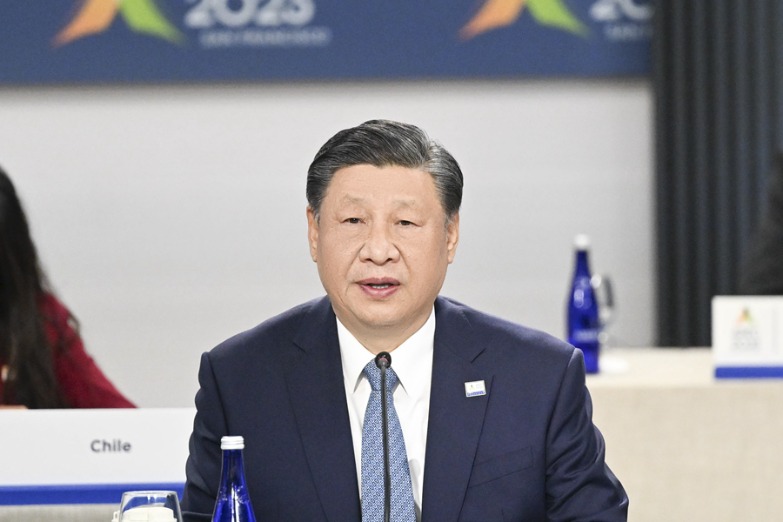
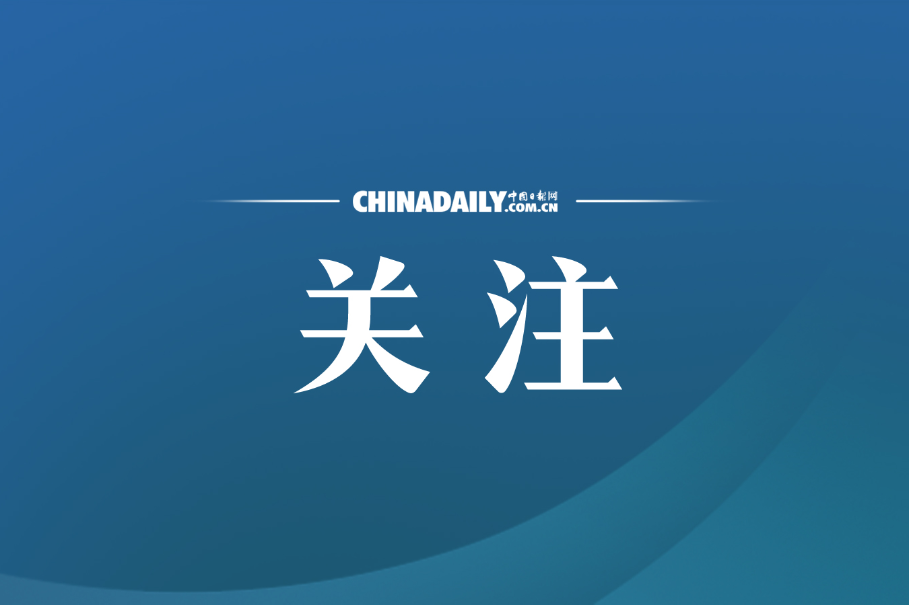
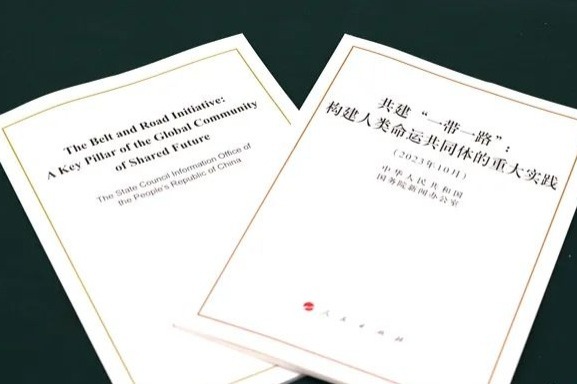
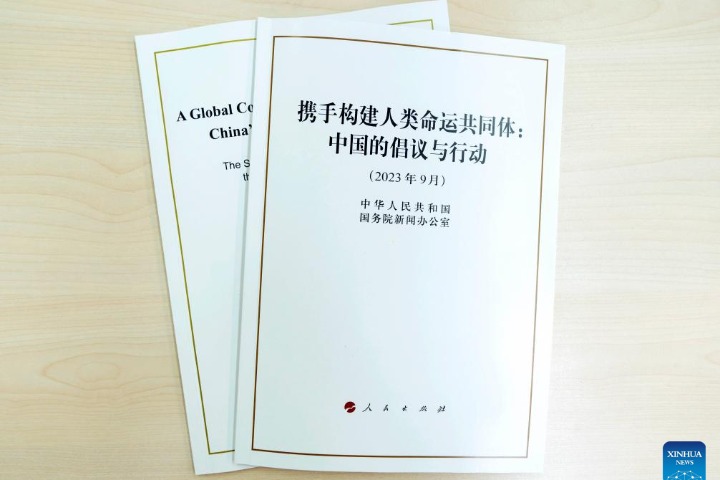
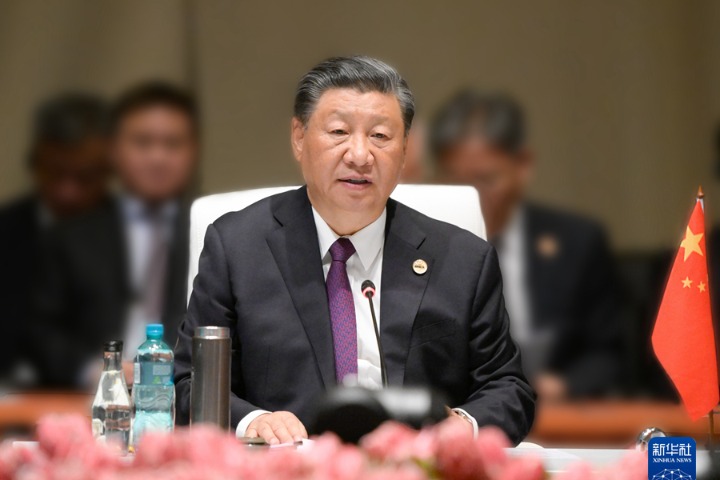



 英语点津微信
英语点津微信 双语小程序
双语小程序